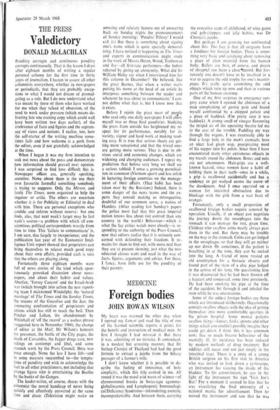Valedictory
THE PRESS DONALD McLACHLAN
Punditry corrupts and continuous punditry corrupts continuously. That is the lesson I draw after eighteen months of writing a regular personal column for the first time in thirty years of journalism. I hasten to assure all other columnists everywhere, whether in newspapers or periodicals, that they are probably excep- tions to what I would not dream of promul- gating as a rule. But I do now understand what was meant by those of them who have worked for me when they talked of obsession, of the need to work under pressure (which means de- livering late one evening copy which could well have been written two days earlier), of the irrelevance of facts and figures and the suprem- acy of views and notions. I realise, too, how the self-starter of the writing machine some- times fails and how welcome is a push from the editor, even if not gratefully acknowledged at the time.
When I began it was my firm intention to seek out news about the press and demonstrate how information should prevail over opinion. I was surprised to find how difficult this is. Newspaper offices are, generally speaking, secretive. New& about them is (to use their own favourite formufa) something somebody is trying to suppress. Only the Mirror, and lately The Times, seem organised to help the inquirer or critic. The others are uncertain whether it is for Publicity or Editorial to deal ith him. There are personal exceptions who confide and inform without reserve: but one finds, alas, that next week's target may be last week's source—a problem with which all con- scientious political correspondents wrestle from time to time. This `failure to communicate' is, I am sure, due largely to inexperience; and the publication last year of the Economist Intel- ligence Unit report showed that proprietors can bring themselves to release much good copy about their own affairs, provided each is sure that the others are playing along.
Fortunately those eighteen months were full of news stories of the kind which spon- taneously provoked discussion about news- papers, and about their habits and values. Aberfan, `Torrey Canyon' and the Israel-Arab war (which brought into action the new report- ing team I nicknamed Windolph); the `natural marriage' of The Times and the Sunday Times, the rescues of the Guardian and the Sun, the simmering confrontation of proprietors and unions which has still to reach the boil. Then Pincher and Lohan, the abandonment by Whitehall of 'off the record' as a useless phrase (suggested here in November 1966), the change of editor at the Mail; Mr Wilson's honours for pressmen, the battle of the City pages, the death of Cassandra, the Jagger drugs case, new rulings on contempt and libel, and some staunch work by the Press Council. Here was meat enough. None the less I have felt—and in some measure succumbed to—the tempta- tions of punditry and wish to acknowledge the fact to all other practitioners, not including that strange figure who is entertaining the Beatles by the banks of the Ganges.
The leader-writer, of course, shares with the columnist' the moral handicap of never being quickly and effectively answered at the same time and place. (television might make an amusing and salutary feature out of answering back on Sunday nights the pronouncements of Sunday morning: 'Pundits' Pillory' I would call it.) But there is something about signing one's name which is quite specially demoral- ising. I have noticed it happening in The Times and experts in communication might study in the work of Messrs Heren, Wood, Trethowan and Jay—all first-rate performers—the hubris released by giving up anonymity. What did Sir William Haley say when I interviewed him for this column in December? He believed, like the great Barnes, that when a writer starts putting his name at the head of an article he interposes something between the reader and whatever he was about to communicate.' I can- not define what that is, but I know now that it exists.
Before I rejoin the great mass of people who read only one daily newspaper I will allow myself two or three final punditries. Studying the press from outside has heightened my re- spect for its performance, notably for its variety, vigour and hard work at making read- ing easy. It is true that serious sheets are get- ting more sensational and that the trivial ones are getting more serious. That is due to ob- vious social and economic changes, which are widening and changing audiences. I repeat my prediction that before very long we shall see a serious tabloid. I sense a growing parochial- ism in comment (Vietnam apart) and less relish in lecturing foreign countries on the manage- ment of their affairs. (That habit has been taken over by the Russians.) Indeed, there is some danger of the news teams and the ex- perts they consult making us introspective, doubtful of our common sense, a nation of Hamlets. (After reading last Sunday's papers the police must feel that this great imperial nation knows less about riot control than any country in the world.) Behaviour—which is what the lay critics watch most closely—is re- sponding to the authority of the Press Council, now that editors realise that it is seriously con- cerned with defending their freedom. It re- mains for them to find out, with more zeal than they are at present showing, just what the new educated classes want and need in the way of facts, figures, arguments and advice. For these, I fancy, have little use for the punditry of their parents.






































 Previous page
Previous page